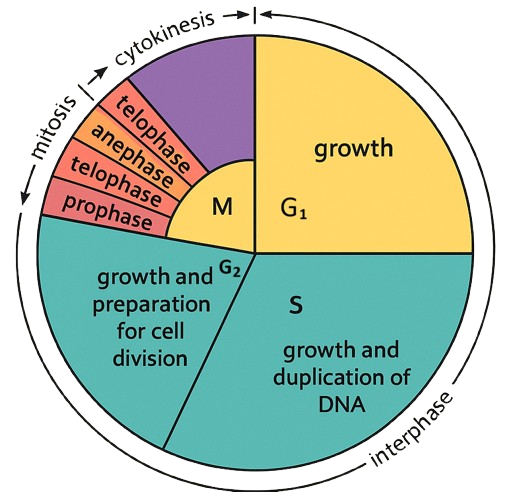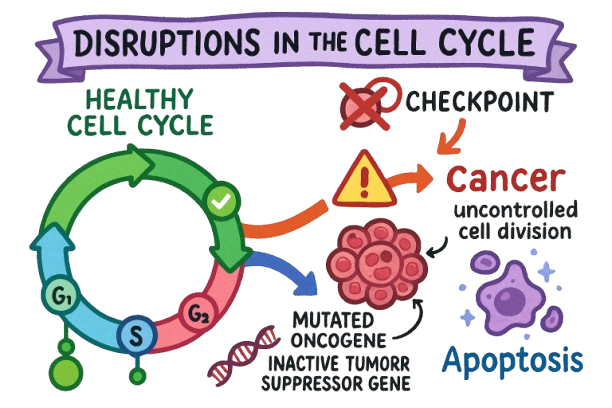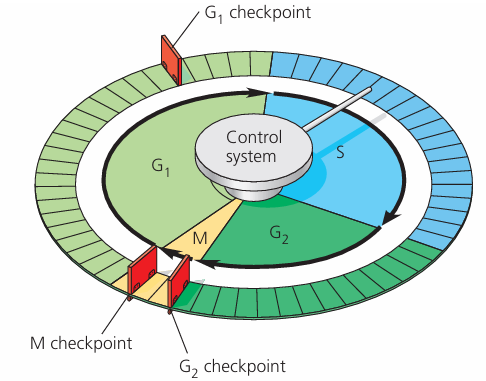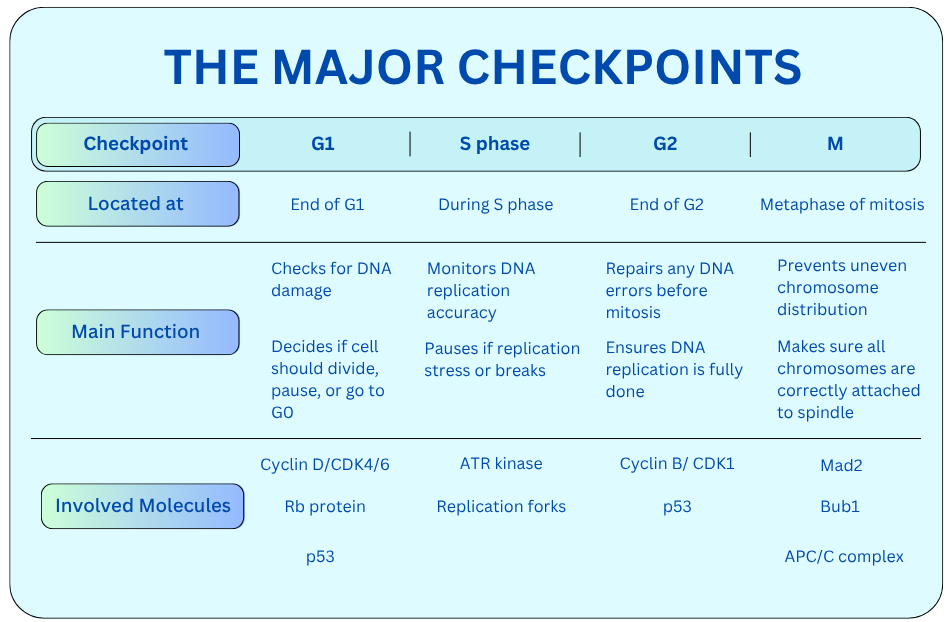AP Biology 4.6 Regulation of Cell Cycle Study Notes - New Syllabus Effective 2025
AP Biology 4.6 Regulation of Cell Cycle Study Notes- New syllabus
AP Biology 4.6 Regulation of Cell Cycle Study Notes – AP Biology – per latest AP Biology Syllabus.
LEARNING OBJECTIVE
Describe the role of checkpoints in regulating the cell cycle.
Key Concepts:
- Introduction to Signal Transduction
4.6.A.1 – A number of internal controls or checkpoints regulate progression through the cell cycle.
🌀 What’s the Cell Cycle?
The cell cycle is basically the life journey of a cell where it:
- Grows in size
- Duplicates DNA
- Divides to form two daughter cells
Main Phases:
- Interphase (G1, S, G2) – The chill & prep time
- M Phase (Mitosis + Cytokinesis) – The action and split time!
🛑 Why Checkpoints Are Super Important
Checkpoints = The cell’s quality control
They help by:
- Spotting DNA damage or problems 🧬
- Pausing everything until it’s fixed ⏸️
- Making sure the cell only moves ahead if everything is safe ✅
Cycle Regulators – Cyclins & CDKs
Cyclins 🌀 – appear and disappear like magic to push the cycle forward
CDKs 🛠️ – enzymes that are activated by cyclins and phosphorylate (add phosphate) to target proteins
✅ Only when cyclins bind to CDKs, the checkpoint can be crossed.
⛔ Without activation = stuck in that phase.
🌱 G0 Phase
If the cell fails G1 checkpoint, it exits into G0, a resting stage.
It won’t divide unless triggered again.
Memory Tip: Think of it like a break before the final exam if the cell isn’t ready.
☠️ If Checkpoints Fail? CANCER ZONE!
Cell divides with damaged or mutated DNA
p53 mutations → no “stop and repair” signal → uncontrolled growth
Many cancers = failed checkpoint guards 😵💫
4.6.A.2 -Interactions between cyclins and cyclin-dependent kinases control the cell cycle.
💡Main Concept:
The cell cycle is not automatic. It’s carefully controlled by proteins called cyclins and enzymes called CDKs (Cyclin-Dependent Kinases). They work together like a lock and key, deciding when a cell should move to the next stage.
🔄 How They Work Together?
- Cyclin levels rise when the cell reaches a certain phase.
- Cyclin binds to its matching CDK → forms cyclin-CDK complex
- This complex activates proteins needed for next phase.
- Once the job is done, cyclins are broken down (destroyed).
🔁 This cycle happens again in the next phase with different cyclins.
🧠 Memory Tip: Think of cyclins as “temporary passwords” they work only for a short time.
🧪 Functions of Cyclin- CDK Complexes
- Allow transition from one phase to next (like G1 → S or G2 → M)
- Check if conditions are right
- Signal repair or delay if needed
- Trigger degradation of old proteins to keep things under control and clean
🚫 What if it Fails?
If cyclin-CDK checkpoints fail:
- Cell may divide with damaged DNA
- Cell may skip repair stage
- Uncontrolled division = cancer risk
4.6.B.1 – Disruptions to the cell cycle may result in cancer or apoptosis.
🔍 What’s This About?
When the cell cycle messes up, it doesn’t just mean the cell gets delayed… it can be life-threatening for the whole organism. This topic is all about what happens when the cell doesn’t follow the rules and why that can lead to things like cancer or cell suicide (apoptosis).
⚙️ Quick Flashback: The Cell Cycle’s Job
The cell cycle controls how a cell grows, copies its DNA, and divides. There are checkpoints (like G₁, G₂, and M phase) that make sure the cell is doing fine at each step.
Think of them like traffic signals 🚦:
- If all’s good → 🟢 Go ahead and divide
- If something’s wrong → 🔴 Stop or fix it
💥 So What Happens If Something Goes Wrong?
🧬 1. Cancer: The Cell Becomes a Rebel
When a cell ignores the checkpoints, it keeps dividing even if it’s damaged. This can lead to:
- Tumors – Masses of cells growing out of control
- Cancer – When those cells also start invading nearby tissues or spreading
🔁 Why Does This Happen?
Some genes that control the cell cycle get mutated:
- Proto-oncogenes (normal growth genes) → turn into oncogenes (which shout “GO!” nonstop)
- Tumor suppressor genes (like p53) → if damaged, they can’t say “STOP”
🧠 So, the cell basically loses the brake and keeps pressing the accelerator!
🧨 2. Apoptosis: The Cell’s Emergency Exit Plan
Not all mistakes become cancer. Sometimes, the cell realizes it’s damaged and it self-destructs 💔
This is called apoptosis – a clean, programmed cell death.
🔎 Why is Apoptosis Important?
- Removes damaged cells → saves the organism
- Stops potential cancer cells
- Helps during development (like separating fingers in embryos)
⚠️ BUT… what if apoptosis is faulty?
- Too little apoptosis → cancer risk
- Too much apoptosis → can lead to degenerative diseases (like nerve damage)
⚖️ Balance is Everything!
A healthy body = proper balance of:
- ✅ Cell growth
- ✅ DNA replication
- ✅ Apoptosis
🔁 When this balance is disrupted:
- Cells may overgrow → Tumors
- Cells may die too early → Tissue damage
4.6.A What’s the role of checkpoints in the cell cycle?
Checkpoints are like the security guards of the cell cycle 🕵️♂️
They monitor everything at key stages and make sure the cell is ready to go ahead.
🚦 Why checkpoints are important? 
- Catch mistakes early 🛑
- Prevent damaged DNA from moving ahead ❌🧬
- Protect from cancer and errors 💪
🔍 Major Checkpoints:
1️⃣ G₁ Checkpoint (Restriction Point):
👉 Is DNA okay? Enough energy? Ready to copy DNA?
✔️ If yes → moves to S phase
❌ If no → either fix or go into G₀ (rest mode)
2️⃣ G₂ Checkpoint:
👉 Did DNA replicate properly?
✔️ If yes → go to mitosis
❌ If no → pause & repair
3️⃣ M Checkpoint (Spindle Checkpoint):
👉 Are all chromosomes attached to spindle fibres?
✔️ If yes → go to anaphase
❌ If no → hold on! Don’t separate yet
4.6.B Describe the effects of disruptions to the cell cycle on the cell or organism
🚨 What happens when the cell cycle goes wrong?
The cell cycle is like a perfectly timed machine ⏱️
But if anything disrupts it, the whole system goes off-track 😬
❌ Effects of Disruptions:
1️⃣ Uncontrolled Cell Division → Cancer
🧬 Checkpoints fail to stop damaged cells
⚠️ Cell keeps dividing even with DNA mutations
💣 Tumour formation (benign or malignant)
2️⃣ Apoptosis (Cell Death) Doesn’t Happen
💀 Normally, damaged cells self-destruct
❗ But if that signal is missed → bad cells survive → can become cancerous
3️⃣ Cell Doesn’t Divide When It Should
🧠 In tissues like brain or skin, where new cells are needed
🥺 If cells don’t divide → tissue damage, improper healing, organ failure
4️⃣ Chromosomal Errors
🧩 If spindle checkpoint fails → wrong chromosome number
➕ Can lead to genetic disorders (like Down syndrome in meiosis)

